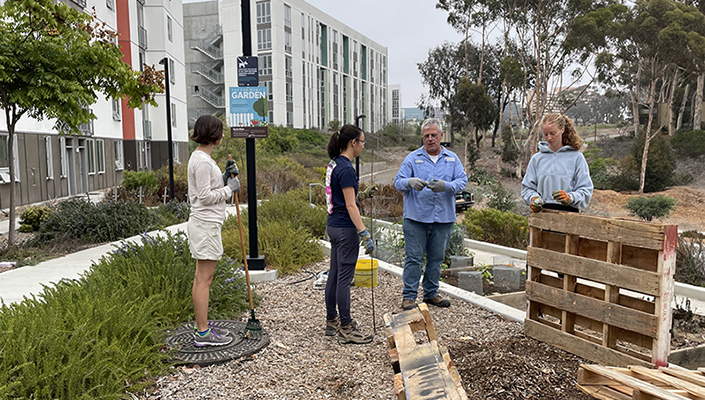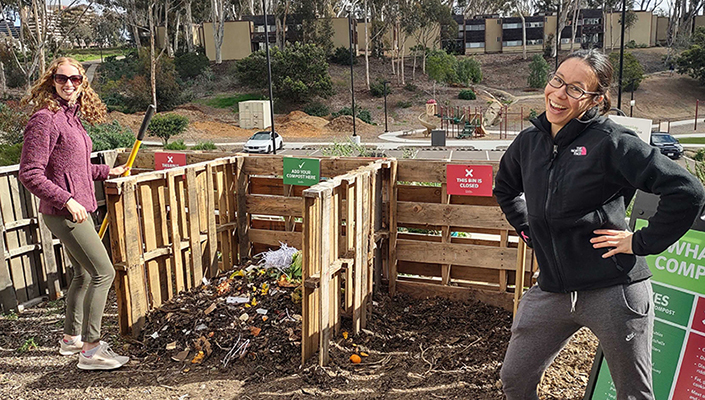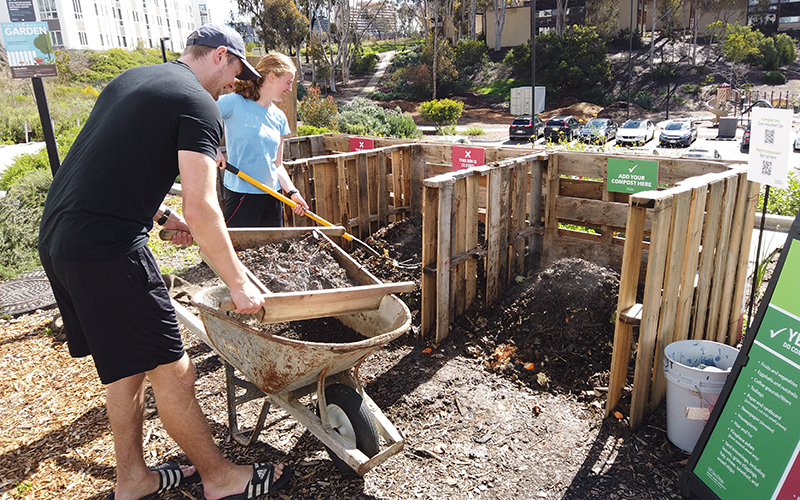A Grassroots Composting Success
UC San Diego students work to transform waste diversion from a distant goal to reality
Story by:
Published Date
Article Content
Sustainability-minded graduate students at UC San Diego living in the Grad and Family Housing (GFH) complex have launched a new composting effort to benefit the environment and enhance the residential community. Following their passion for sustainability, the students acted as leaders to accelerate the university’s efforts toward its sustainability goals of achieving zero waste.
According to the UC San Diego 2021 Sustainability Report, the university was able to raise its waste diversion rate to 51 percent, an 8 percent increase from the previous year. The university also composted more than 13 tons of paper towels over the past year. The students, both from Scripps Institution of Oceanography and Biological Sciences departments at UC San Diego, noted that one-third of landfill waste created by GFH is food waste, and an impactful way to cut out food waste is to compost.
Composting is a hot, aerobic process that occurs under a sheet of burlap. When food scraps are added to compost bins instead of landfills, waste is diverted from contributing to greenhouse gas emissions and creates a new product—compost. Microorganisms break down organic materials, creating nutrient-rich soil that can be used for gardening. According to students, a complex and involved process like composting requires not only volunteer efforts but system support in the future to remain successful.
Upon moving into the GFH complex in January 2022, second-year master’s student Heidi Tate noticed there was no compost system set up in graduate and family housing. She found that surprising, considering that sustainability is something UC San Diego prides itself on. Her own passion for sustainability led her to join a sub-committee of the Graduate & Professional Student Association Climate Action Policy Committee (GPSA CAP) that was formed in 2021.
Three of the sub-committee members, Scripps physical oceanography PhD candidate and then-CAP chair Taylor McKie; Scripps physical oceanography PhD candidate Sophie Shapiro; and UC San Diego chemical biology PhD candidate and Mesa Nueva garden manager Mallory Evanoff wanted to be proactive about the carbon footprint of about 5,000 residents living in Mesa Nueva.
“Motivations for starting this committee included CAP's interest in accelerating zero-waste goals and a much-needed desire for community composting by Mesa Nueva gardeners, staff, and GFH residents,” said McKie.
The implementation of compost bins for residents onsite created sustainable change to improve the complex, community, and UC San Diego.
The sub-committee initially met with Chris Johnson, a landscape sustainability worker for Facilities Management at UC San Diego, who led the Eleanor Roosevelt College compost garden for undergraduate students on campus. Johnson’s primary responsibility is to provide guidance to students working in student gardens, including informing students on the steps needed to produce compost in their soil amendments. Johnson provided the CAP committee with information about existing gardens, compost bins, and guidance to create their own. His success showed the team that creating a compost system was possible, and his support was significant throughout this process.
McKie and the GPSA-CAP sub-committee spent a year researching composting, gathering data, developing contingency plans, working out staffing plans for volunteers, and designing the bins. They also applied for grants to buy materials, a process slowed by the pandemic.
The compost system finally received approval from Housing Dining Hospitality (HDH) at UC San Diego in September 2022 as a result of the committee’s assertive efforts in persuading GFH to partner with them. The compost system was built in the Mesa Nueva community garden in October 2022, with a pilot period of several months.


There was a grand opening to celebrate the arrival of the compost bins in February 2023, with the event drawing roughly 50 participants. “The compost team was blown away by how many people were waiting for years to compost!” said Shapiro.
Analisa Freitas, a volunteer and student in the one-year Master of Advanced Studies program in Marine Biodiversity and Conservation (MAS MBC) at Scripps, grew up composting with her mother. She encourages everyone living at the GFH complex to put their food scraps in the freezer, or a sealed container, and bring them down to the garden’s wooden bins once a week.
The Mesa Nueva community garden is centrally located, making it easy for residents to stop by and drop off compostable waste, thus reducing methane emissions and the climate footprint of the community. Essentially, volunteers like Freitas help turn the compost three times a week and sift the finished compost. There are three compost bins, one open for adding compost and two closed for composting. The Mesa Nueva compost team notifies gardeners when the fresh dirt is available after sifting, so they can bring the compost back into the community to use for gardening.
“The time frame for waste decomposition depends on the type of food scrap and time of year,” explained Tate, “but it usually takes around two to four weeks to be made into compost.”
Staffing has been the main challenge of this volunteer-run project. In order to maintain the system and eventually increase the compost’s capacity, a bigger workforce is needed.
“We need to make the compost bins more sustainable, but not in the environmental sense,” said Shapiro. “We need to recruit volunteers, encourage people to take over, train new people, and do outreach. The greatest measure of success is that five to ten years from now compost bins are still running.”
To ensure this project’s full sustainability, the students believe a paid part-time position is essential to not only manage compost and keep the garden sustainable over time but to ensure it is part of UC San Diego’s institutional structure. In order to get there, it takes the effort and volunteers of the compost team to make a change. According to McKie, it is a growing pattern where laborers are not getting money or recognition, so programs like these cycle out with students, and eventually come to an end.
“The only way to keep momentum and sustain it is to have institutional structures in place,” said McKie, “and in the meantime, we can still promote volunteers even once there is a part-time paid position.”
The Mesa Nueva compost bins are a small step toward sustainability, and showcase a collaborative, student-led effort to help push the university to achieve zero waste. “This started as a sustainability project,” said Shapiro, “but became more of a community stewardship project.”
The compost team within the GPSA CAP committee is holding more events for recruitment, community, and stewardship. According to Shapiro, “The community is almost as important as sustainability, but this needs to be a funded effort.” McKie also noted the importance of the community effort. “Because this matters to all, we all have to be part of the solution."


Interested in getting involved or learning more about Mesa Nueva compost garden?
Check out the volunteer interest sign-up sheet and join the team for a Compost Brunch Event on April 29.
Visit UC San Diego's composting page to learn about other community composts on campus.
Share This:
You May Also Like
Stay in the Know
Keep up with all the latest from UC San Diego. Subscribe to the newsletter today.




